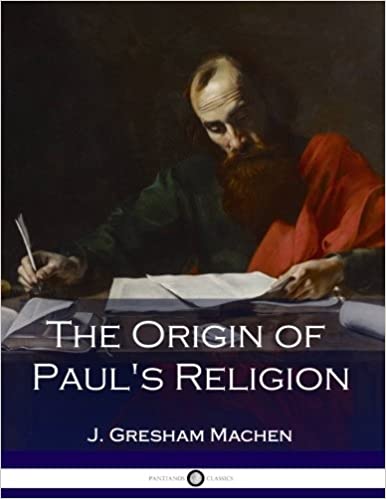A Brief Book Summary from Books At a Glance
By Steve West
About the Author
J. Gresham Machen was Professor of New Testament at Westminster Theological Seminary. He wrote several very influential books which are still read today.
Introduction
In this book, Machen explores the origins of Christianity by examining the origins and sources of Paul’s religious and theological beliefs. He interacts with an array of scholarly options, and argues that Paul’s view of Christ was in accord with the earliest believers, that it wasn’t derived from pagan influences, and that it was ultimately based on Paul’s personal relationship with the resurrected Lord Jesus Christ who was Paul’s Lord and Savior.
Table of Contents
Chapter 1 Introduction
Chapter 2 The Early Years
Chapter 3 The Triumph of Gentile Freedom
Chapter 4 Paul and Jesus
Chapter 5 The Jewish Environment
Chapter 6 The Religion of the Hellenistic Age
Chapter 7 Redemption in Pagan Religion and in Paul
Chapter 8 The Lordship of Jesus
Summary
Chapter 1: Introduction
It is essential for the church to understand how Christianity came to be. Given the historical importance of Paul for Christianity, if we can determine the origins of Paul’s religion, then we will know the origins of Christianity. When we study the Gospels, we find that the origin of their view of Jesus is the same as Paul’s. The establishment of Christianity as a world religion is in many ways attributable to Paul (although we want to be careful in how we understand this claim). Other religions grew, but they were pluralistic, unlike Christianity. Jewish synagogues had already been established in many cities, and Paul built on that religious-moral foundation.
More than the Jews, though, Paul preached freedom from the Law for the Gentiles. This was not on the basis of compromise, but on the basis of theological principle. Paul’s theology undergirded the Gentile mission, and he also went farther than anyone—through hardship—to establish the gospel in major cities around the known world. Is it possible that the picture of Christ we get in Paul is merely a reflection of his brilliant mind? This is implausible, because Paul was concerned with truth.
His religion was a religion of redemption, and that hinged on Christology (i.e. who Jesus really was and what he actually did). Paul held Christ to be God incarnate. It is impossible to exaggerate how shocking this idea was, coming from the mind of a monotheist like Paul. Every attempt to understand the origins of Paul’s Christology that is detached from the historical Jesus has failed.
The primary sources for understanding Paul are the Book of Acts and his own epistles. The case for the genuineness of all thirteen epistles traditionally ascribed to Paul is stronger than alternative views, as is the case for the author of Acts being a traveling companion of Paul. It is impossible to cut out all of the miraculous accounts from the New Testament in order to find a believable, naturalistic core. The New Testament documents belong to the First Century. Paul’s theology and Christology were not in conflict with that of the other apostles.
Chapter 2: The Early Years
Paul’s birth in Tarsus is now widely accepted. His Greek is excellent and demonstrates knowledge of that language from an early age. Tarsus was a commercial and intellectual center. There is no doubt that Paul actually had Roman citizenship, but he didn’t always use the rights that attended citizenship. As a “Hebrew of the Hebrews” Paul was not a Hellenistic Jew, but fundamentally a Palestinian Jew in his family origin and tradition. Moreover, he was a Pharisee, educated under Gamaliel. He was in Jerusalem before his conversion, and he persecuted the church.
We do not know if Paul ever saw Jesus before the post-resurrection appearance, but he would not have had any significant dealings or conversations with him. Given the stir that Jesus caused, however, there is little doubt that Paul would have heard about him. We can be confident that Paul was not moving towards becoming a follower of Jesus prior to his experience of meeting the risen Christ. Alternative explanations for his experience (e.g. hallucination, or an epileptic seizure) cannot bear the weight of scrutiny. Paul asserted that he did have visions, but he always distinguished his visionary experiences from the type of event that occurred on the road to Damascus.
[To continue reading this summary, please see below....]The remainder of this article is premium content. Become a member to continue reading.
Already have an account? Sign In
